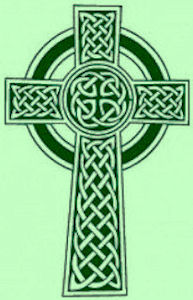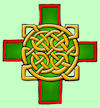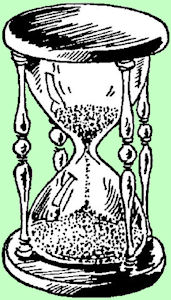|
%20(Reg).jpg)
Volume
41, #7
March 2026
|

Download
PDF
Plant these "seeds" well
and water often. Enjoy!
|
Morning Prayer
. . . . .
Thomas Dekker
“To awaken each morning with a smile
brightening my face;
 to greet the day with reverence for the
opportunities it contains; to greet the day with reverence for the
opportunities it contains;
to approach my work with a clean
mind;
to hold ever before me, even in the
doing of little things,
the Ultimate
Purpose toward which I am working;
to meet men and women with laughter on my lips and love in my heart;
to be gentle, kind, and courteous through all the hours;
to approach the night with weariness that ever woos sleep
and the joy that comes
from work well done —
this is how I desire to waste wisely my days.”
 
Enemy of Progress
. . . . .
John H. Patterson
“Good enough is the enemy of all progress.”
 
As God Created You…!
. . . . .
St. Francis de Sales
“Do not wish to be anything but what you are,
and try to be that perfectly.”
 
Look Fear in the Face
. . . . .
Eleanor Roosevelt
“I gain strength, courage and confidence by every experience in
which I must stop and look fear in the face …
I say to myself, I’ve lived through this and can take the next thing that comes
along … We must do the things we think we cannot do.”
 
A Footpath to Peace
. . . . .
Henry van Dyke
“To be glad of life because it gives you the chance to love, to
work,
 to play and to look up at the stars, to play and to look up at the stars,
To be satisfied with your possessions but not contented with yourself
until you
have made the best of them,
To despise nothing in the world except falsehood and meanness
and to fear
nothing except cowardice,
To be governed by your admirations rather than by your disgusts,
To covet nothing that is your neighbor’s except
for his or her kindness of heart
and gentleness of manners,
To think seldom of your enemies … often of your friends,
These are little guideposts on the footpath to peace.”
 
Recognize Good Work
. . . . .
Soundings,
Vol. C, # 4A
“Recognize good work and you give others the will to do better work. Don’t
recognize it and you feed one of the biggest gripes people have — lack of
recognition.
The best thing to do every time is to give credit where credit is due. You’ll be
a better person for it and you’ll win more respect.”
 
Celtic Spirituality
. . . . .
Esther de Waal,
“The Extraordinary in the Ordinary,” Weavings,
Vol. II, # 3, p. 13
 “The Celtic approach to God opens up a world in which nothing is too common to
be exalted and nothing is so exalted that it cannot be made common. …
“The Celtic approach to God opens up a world in which nothing is too common to
be exalted and nothing is so exalted that it cannot be made common. …
As we read these words we can glimpse that experience of the presence of God
which has been the reality of … people’s lives ever since the start of the day.
It is a gift which they have, and which they bring to us, of taking this moment,
this place, this happening as the time and place for an encounter with God. So
God meets us where we are, at home, at work, in the daily, in the ordinary.”
 
Act Precedes Will
. . . . .
Parker Palmer
… “Do not think your way into a new kind of living,
but live your way into a
new kind of thinking.”
 
An Irish Blessing
|
 |
“And may the blessing
of the great rains be upon you.
May they beat upon your spirit
and wash it fair and clean.
And leave there many a shining pool
and sometimes a star.” |
 |
 
Positive vs. Negative Pride. . . . .
Rev. Robert H. Schuller,
Self-Esteem: The New Reformation
… “We have failed to distinguish between positive pride and negative pride.
Negative pride is that destructive arrogance that assumes, ‘I can do anything
all by myself!’ It is the exact opposite of that healthy humility I choose to
call ‘self-esteem.’ Positive pride is that creative and compassionate confidence
Christ inspired when he said, ‘You are the light of the world!’”
 
Love & Talent
. . . . .
Sydney J. Harris
“Love that is not expressed in loving action does not really exist, just as
talent that does not express itself in creative works does not exist; neither of
these is a state of mind, or feeling, but an activity, or it is a myth.”
 
The Good Life
. . . . .
Anonymous
“When you can look at yesterday without regret and at tomorrow without fear,
you’re on your way to the good life.”
 
Cultivate Tact
. . . . .
Baltasar Gracián
“Cultivate tact for it is the mark of culture … the lubricant of human
relationships, softening contacts and minimizing friction.
 
On Experience
. . . . .
Aldous Huxley
“Experience is not what happens to a person, it is what one does with what
happens to him to her. It is a gift for dealing with the accidents of existence,
not the accidents themselves.”
 
The Time Is Short
. . . . .
Phillips Brooks
“Oh, my dear friends, you who are letting miserable misunderstandings run on
from year to year, meaning to clear them up some day; you who are keeping
wretched quarrels alive because you cannot quite make up your mind that now is
the day to
 sacrifice your pride and kill them; you who are passing men sullenly
upon the street, not speaking to them out of some silly spite, and yet knowing
that it would fill you with shame and remorse if you heard that one of these men
were dead tomorrow morning; you who are letting your neighbor starve, till you
hear that he is dying of starvation; or letting your friend’s heart ache for a
word of appreciation or sympathy, which you mean to give him some day — if you
only could know and see and feel, all of a sudden, that “the time is short,” how
it would break the spell! How you would go instantly and do the thing which you
might never have another chance to do.” sacrifice your pride and kill them; you who are passing men sullenly
upon the street, not speaking to them out of some silly spite, and yet knowing
that it would fill you with shame and remorse if you heard that one of these men
were dead tomorrow morning; you who are letting your neighbor starve, till you
hear that he is dying of starvation; or letting your friend’s heart ache for a
word of appreciation or sympathy, which you mean to give him some day — if you
only could know and see and feel, all of a sudden, that “the time is short,” how
it would break the spell! How you would go instantly and do the thing which you
might never have another chance to do.”
 
The Frozen Eagle
. . . . .
Source Unknown
Once a proud eagle perched on the tip of a chunk of ice floating swiftly down
the river. The big bird seemed oblivious to the tremendous waterfall that lay
ahead. At the same time, a hunter was walking down a path along the river’s
edge. Seeing the huge bird perched on the chunk of ice, the hunter clapped his
hands and cried out, “Brother Eagle, fly away, fly away. There is danger ahead!”
The eagle merely shrugged its great wings as if to say, “Don’t bother me. I know
what I’m doing.”
As the chunk of ice floated closer to the waterfall, the hunter again cried out,
“Fly away, Brother Eagle! There is a waterfall ahead!”
At that moment, the eagle looked down just in time to see that the chunk of ice
had reached the brink of the waterfall and was about to go over the edge. It
spread its mighty wings and prepared for immediate take-off. But the eagle was
unable to rise. Its claws were frozen to the ice and it went down with the
iceberg.
What are you frozen to? What do you need to let go of, to stop clinging to? Hear
the voice of Jesus calling out to you — “There’s danger ahead.”
For an eagle to soar high in the sky it has to let go of the earth. So too, for
people.

 

|
%20(Reg).jpg)

 to greet the day with reverence for the
opportunities it contains;
to greet the day with reverence for the
opportunities it contains; to play and to look up at the stars,
to play and to look up at the stars, “The Celtic approach to God opens up a world in which nothing is too common to
be exalted and nothing is so exalted that it cannot be made common. …
“The Celtic approach to God opens up a world in which nothing is too common to
be exalted and nothing is so exalted that it cannot be made common. … 
 sacrifice your pride and kill them; you who are passing men sullenly
upon the street, not speaking to them out of some silly spite, and yet knowing
that it would fill you with shame and remorse if you heard that one of these men
were dead tomorrow morning; you who are letting your neighbor starve, till you
hear that he is dying of starvation; or letting your friend’s heart ache for a
word of appreciation or sympathy, which you mean to give him some day — if you
only could know and see and feel, all of a sudden, that “the time is short,” how
it would break the spell! How you would go instantly and do the thing which you
might never have another chance to do.”
sacrifice your pride and kill them; you who are passing men sullenly
upon the street, not speaking to them out of some silly spite, and yet knowing
that it would fill you with shame and remorse if you heard that one of these men
were dead tomorrow morning; you who are letting your neighbor starve, till you
hear that he is dying of starvation; or letting your friend’s heart ache for a
word of appreciation or sympathy, which you mean to give him some day — if you
only could know and see and feel, all of a sudden, that “the time is short,” how
it would break the spell! How you would go instantly and do the thing which you
might never have another chance to do.”

-green.jpg)